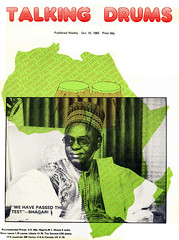But Discipline Top Men
Ben Mensah
"Unless we can punish the powerful affluent for their atrocities, we shall have no moral justification whatsoever to sanction the poor even for a crime as grievous as armed robbery".
For a President whose first term of office enjoyed the success of the experiment with the democratic process, and has provided peace, houses for the people, developed a new federal capital and pursued a policy of qualitative functional education leading to an increase in the number of federal universities from 13- 21 President Shagari has sufficient cause to proclaim, 'we have passed the test'.
All those who contributed to Nigeria's success in the test during the past four years were congratulated by the President in a speech on October 1st to mark his inauguration for a second four-year term and also the 23rd independence anniversary of the country from British colonial rule.
For the electorate, President Shagari commended their coming of age and for exercising their constitutional obligation in a mature manner. The civil servants were equally commended for their support for the administration.
Of particular interest were the congratulations heaped on the politicians, especially those who lost the elections, the President Shagari advised them not to be dampened by defeat but co-operate and give the best of their services to the fatherland.
The President's delight over the state of affairs in his country and optimism for brighter things to come could not be dampened by the latest World Bank Report which singles out the Congo and Cameroon as the only two West African countries to have had their average per capita income increased.
Indeed the World Bank cited the mess in the Nigerian economy, the largest in sub-saharan Africa to indicate the gravity of the economic crisis in the area.
But all this may be due to the fact that President Shagari is aware of the gloomy state of his country's economy and is taking measures to remedy it. He acknowledged that the country's oil export earnings, which reached a peak of 22,400 million dollars in 1980 declined to an estimated 9,600 million in 1983.
Moreover, the exportable surplus of oil production is being gradually reduced by the growing domestic consumption of refined petroleum products. With the fall in oil revenues, the country is now faced with a growing shortage of foreign exchange. At the same time, the manufacturing sector, which is unhappily import orientated, continues to weaken, he noted.
Measures to be taken to improve the situation include government agencies taking a lead in waste reduction and unprofitable government ventures being scrapped.
What the President fails to tackle realistically in his speech is how he intends to deal with the picture portrayed at the beginning of this piece and which was the basis of editorial comments in several Nigerian papers on the eve of his second inauguration.
No doubt, President Shagari stated that he expects his top government officials to demonstrate not only competence, resourcefulness and dedication but also an exemplary standard of probity and integrity.
He pledged that in the spirit of the ongoing ethical revolution, proven cases of abuse of office and corruption will attract immediate sanction but as can be seen from the unanimous stand of the country's editorial writers which are published elsewhere in this magazine, the President's handling of the moral decadence among the top echelon of the society, particularly, Senators and other lawmakers has not been appreciative.
President Shagari therefore needs to be reminded that his pledge to all Nigerians to uphold the nation's constitution does not only entail ensuring abundance of food, peace, houses and schools for the people. As the police and military play their role of ensuring peace, farmers produce enough food and civil servants successfully oil the bureaucracy, the politicians must also play their role by leading exemplary lives.
President Shagari must therefore ensure that the 'we' he used in his 'we have passed the test' includes the top politicians who must be held strictly accountable for their misdeeds. Only by doing this will the President again be ensuring the stability, peace and prosperity of his country for the next four years of his leadership.
